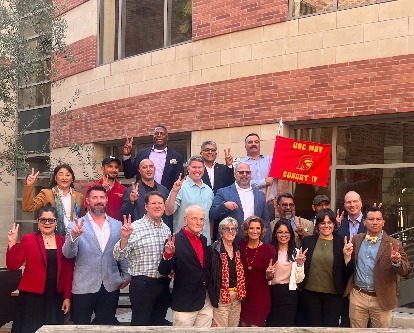
Alumni Honor Founding MBV Director Robert Turrill with Commemorative Plaque
Through mentorship and commitment, the founding director of the Master of Business for Veterans’ program has inspired Trojans in and out of the classroom.
New Study Explores People's Reluctance to Downplay Moral Transgressions
New Study Explores People's Reluctance to Downplay Moral Transgressions
Research by Professor Ike Silver and co-authors examines why people tend to escalate moral judgments when responding publicly to moral transgressions.

Ike Silver, Assistant Professor of Marketing.
[USC Photo / David Sprague]
As the business world increasingly collides with social issues, it is more important than ever to understand how personal values influence consumer decision-making and how brands can effectively navigate them. These are the kinds of dynamics Ike Silver, an assistant professor of marketing at USC Marshall School of Business, grapples with in his research.
“I tend to say that I study three things — doing good, taking sides, and getting angry. Each of these is a moral signaling process and a place where consumers’ morals intersect with marketing strategy,” Silver explained.
One topic Silver has been exploring recently is the psychology of “cancellation” and why people might be prone to escalate rather than de-escalate their anger in public settings. In a new research paper, “Reluctance to Downplay: Asymmetric Sensitivity to Differences in the Severity of Moral Transgressions,” Silver and collaborators Amanda Geiser of the University of California, Berkeley, and Deborah Small of Yale University investigate why this occurs.
“We were really interested in the idea of outrage culture and what compels people to engage in condemnation," Silver said. “We condemn corporations, public figures, politicians, and acquaintances all the time. Here, we focused on anger at people who do bad things.”
The researchers wanted to understand why observers are reluctant to show leniency or offer opportunities for redemption, even when they might see nuance in the case.
In a series of social-psychological experiments, the researchers presented participants with pairs of crimes — such as sexual misconduct cases of notable public figures — for which one was objectively worse than the other. Participants were asked to indicate how outraged they were at each case and how much each offender should be punished.
The researchers found that when people are asked to compare different crimes in a way that allows them to express stronger condemnation (by saying one is worse than another), they are willing to do so. But when asked to compare the crimes in a way that forces them to de-escalate condemnation (by saying that one is less bad than another), they become uncomfortable acknowledging moral differences between the cases. In other words, people are far more comfortable saying a more severe infraction deserves more punishment, than they are saying a less severe infraction deserves less punishment.
According to Silver, people resist de-escalating condemnation (i.e. saying A is not as bad as B) because — unlike escalating (i.e. saying B is worse than A) — it can look like minimizing the offense, which in turn, reflects bad moral character. Scaling down can be perceived as downplaying harm and, therefore, can have negative reputational consequences to the person in the judge’s seat.
What we’ve uncovered in this paper is a motivation on the part of individuals to avoid expressing leniency, which has, we think, a variety of implications for crisis management, marketing, public relations, and more.
— Ike Silver
Assistant Professor of Marketing
“It’s a demonstration of a broader phenomenon that’s relevant to outrage culture and cancellation: People really don't want to de-escalate. They really don't want to say that something is not that bad compared to a relevant benchmark,” Silver explained.
A similar psychology may also help explain why initial accusations of wrongdoing escalate into widespread outrage. In group discussions about misconduct — for example, within news outlets or on social media — there is a social incentive to match or exceed others' levels of outrage lest one seem insufficiently concerned about the issue. If everyone leans toward harsher judgments, even a relatively benign transgression may become overwhelmingly condemned as the conversation grows.
“What we’ve uncovered in this paper is a motivation on the part of individuals to avoid expressing leniency, which has, we think, a variety of implications for crisis management, marketing, public relations, and more,” Silver said.
Silver explains that in principle our justice system is proportional, but in practice, it depends on whether people are comfortable with acknowledging degrees of nuance. If acknowledging nuance puts their moral character in question, they may abandon proportional judgment and lean towards harsher condemnation. His research also shows that this effect is stronger for crimes and transgressions that are seen as more outrageous or morally charged. In these cases, it becomes even more important to seem like someone who condemns. Scandals are loud, in part, because people want others to see that they take the offense seriously.
Understanding these dynamics is essential for crisis management, public relations, and branding professionals to make sound marketing recommendations. The potential applications of this research are far-reaching, encompassing business, politics, and the legal system.
RELATED
Alumni Honor Founding MBV Director Robert Turrill with Commemorative Plaque
Through mentorship and commitment, the founding director of the Master of Business for Veterans’ program has inspired Trojans in and out of the classroom.
Quoted: Neha Bairoliya in Yahoo! Finance
Bairoliya and her fellow researcher elaborate on their study indicating that adults should wait until they are of normal retirement age before claiming Social Security benefits.
Op-Ed: Danny Sokol in The Press Democrat
Sokol and his co-author write that the new fee on H-1B visa applications will hurt U.S. growth and innovation.
Quoted: Ike Silver in Wall Street Journal
Silver details his own study which shows that people are more likely to recognize hypocrisy in others and less so in themselves.
Cited: Peter Cardon in Minnesota Star Tribune
Business leaders who utilized AI say integrity will matter most in the age of artificial intelligence, according to a survey conducted by Cardon.